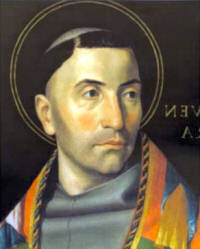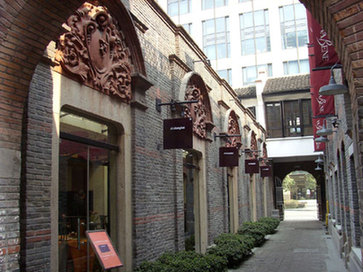Showing posts with label poverty. Show all posts
Showing posts with label poverty. Show all posts
Monday, 10 August 2015
Fast-Food Spirituality
Posted by
Supertradmum
Perhaps most Catholics do not know that some saints had to face the courts of the Inquisition and defend their writings, as well as their new orders.
Because of the numerous heretical writings and new orders, such as those spawning from the heresy of the Albigensians, some saints had to prove before Church officials, their true orthodoxy and obedience to Holy Mother Church.
SS. Ignatius of Loyola and Teresa of Avila had to submit to this type of investigation. Of course, as they were totally obedience and orthodox, their causes were upheld as good and true. That they were humble and followed the long teaching of the Church regarding waiting on God, proved their holiness.
What we find today is the opposite type of trial-the trial of those who are orthodox by those who are unorthodox.
Years ago, before Mr. Voris used the phrase, I wrote of the theology of nice, the prevailing religious opinion that peace, tranquility, and tolerance had become the stand of too many Catholics, including priests and nuns. The greatest good for decades in some areas, as Fulton J. Sheen noted as well, has been tolerance.
But, among Catholics, this religion of nicety means that difficult situations, or problems can never be brought up or discussed. The tyranny of silence has fallen over some parishes and even dioceses where one simply cannot bring up such issues as illegal Masses said daily by lax priests, or New Age spirituality being taught, or the heresies endemic among Charismatics. If one wants to help teach or correct errors, one finds that the vast majority of people in certain areas are unteachable.
One of my friends noted that people want short-cuts to holiness, and do not want to endure the work of study and the long journey to higher prayer and holiness. He told me that in this fast-food culture, people want holiness NOW, without the work.
And, if they are told that become a saint is hard and involves suffering, the conversation ends.
At one point in time, he was considering a Dominican vocation, (somewhere out east of here), and discovered what I saw in the vision of the Smarties, that those around him only wanted the consolations without the Cross.
We shall be caught up in the Cross whether we want to or not. Either we shall be crucified with Christ, sharing in His Passion, or we shall be one of those who stands and watches, even deriding those who choose to endure the long, painful way of the long teaching of the Church on prayer and penance.
Today, in prayer, it was clear to me that in order to be able to stand up against the disobedience and mediocrity in the Church, I would have to do more penance.
Most crucifixes depict a serene Christ, already dead. Few show the agony of the Dying Christ.
Those who want fast-food holiness or spirituality cannot endure the long suffering of purgation and penance.
There is no easy way to find God and be one with Him.
When I have tried to teach in the past, and I was thinking of this phenomenon this morning when contemplating the fact that those younger than I am do not relate to metaphors, I became aware, by 1982, at the latest, that my students no longer shared the same language in order to understand great literature.
For example, I was teaching a class on the Arthurian myths, and all my students, at ND had been valedictorians of their high school graduating class. And yet, one young woman did not know the word, "chalice". She had never heard it before we read the story of the Holy Grail. She was confused.
I told her what a chalice was, as we were discussing the text, and she said, "Oh, we call that the cup."
David Jones wrote about this sad phenomenon of the Western man and woman losing the common Catholic heritage, or even larger Western heritage of words referring to something in the common culture.
He described "the Break" in the consciousness of the West as occurring absolutely in World War I.
The "Break" now is obvious in the Church. Words no longer mean the same thing to Catholics. Concepts regarding the sacraments, or prayer, or worship do not resound with the same definitions as in early times.
We cannot share metaphors or, more seriously, theological concepts, or even basic religious truths as the language of Catholicism has become more and more distorted by either heretical or New Age interpretations, or by laziness.
A language of Faith must be reclaimed and this reclamation involves hard work on the part of those, like me, who want to teach the real meanings of words, or those who want to learn. The willingness to learn and not merely to get knowledge one's self is a sign of good will and humility.
Few want to learn. They want fast-food spirituality.
I have written before here on the fact that one cannot take short-cuts to holiness. First of all, as noted in the hundred of posts in the perfection series, one begins with and in orthodoxy.
If one cannot "pass" the test of basic truths of the Faith, one clearly has to go back to Square One.
When I was in the convent in the novitiate, I had to go back to Square One, as all women were treated the same, whether they had a degree in theology or not.
I found the test delightful, and I learned more and more going back to the basics. Nothing which is good and truthful can be boring.
But, then, I was always a cook who did everything the "long way", like making my own pie crust, making mayonnaise, not buying frozen dinners or much less frozen anything.
Like a good Montessori teacher, I taught my son to do things "from scratch" and to enjoy every slow step of the way.
In the land of spirituality, there are no fast-food prayers, or techniques, or ways to holiness. That was the teaching of the heretics over and over and over.
Unlike SS. Ignatius Loyola and Teresa of Avila who understood that prayer was a lifestyle and not a method. that prayer, as I noted in the Framing Prayer series, was more than mere adaptation, but a way of looking at life, those who want quick results, and who do not want to learn "the long way" will fall into deceit.
Satan has a common ploy to make people believe that they are holier than they really are. Fr. Chad Ripperger, in a talk I heard years ago and which is online somewhere, told a shocked audience that most people had not even begun to climb the ladder of holiness.
Prayer and study, quiet and simplicity, humility and self-knowledge.....a few of those key rungs on the ladder which bring us all back to the work of our lives-becoming saints.
Wednesday, 15 July 2015
From Today's Office of Readings And More
Posted by
Supertradmum
Looking towards the darkness where one finds God is a metaphor for the seeking of purgation and cleansing of all sin in order to be illumined by Christ...Bonaventure is calling all of us to deep meditation and contemplation.
...we must suspend all the operations of the mind and we must transform the peak of our affections, directing them to God alone. This is a sacred mystical experience. It cannot be comprehended by anyone unless he surrenders himself to it; nor can he surrender himself to it unless he longs for it; nor can he long for it unless the Holy Spirit, whom Christ sent into the world, should come and inflame his innermost soul. Hence the Apostle says that this mystical wisdom is revealed by the Holy Spirit.
If you ask how such things can occur, seek the answer in God’s grace, not in doctrine; in the longing of the will, not in the understanding; in the sighs of prayer, not in research; seek the bridegroom not the teacher; God and not man; darkness not daylight; and look not to the light but rather to the raging fire that carries the soul to God with intense fervour and glowing love. The fire is God, and the furnace is in Jerusalem, fired by Christ in the ardour of his loving passion. Only he understood this who said: My soul chose hanging and my bones death. Anyone who cherishes this kind of death can see God, for it is certainly true that: No man can look upon me and live.
Let us die, then, and enter into the darkness, silencing our anxieties, our passions and all the fantasies of our imagination. Let us pass over with the crucified Christ from this world to the Father, so that, when the Father has shown himself to us, we can say with Philip: It is enough. We may hear with Paul: My grace is sufficient for you; and we can rejoice with David, saying: My flesh and my heart fail me, but God is the strength of my heart and my heritage for ever. Blessed be the Lord for ever, and let all the people say: Amen. Amen!
These words St. Bede explains as follows : "After looking all around and making enquiries as to whether anyone was prepared to give Him hospitality for He was so poor that no one looked upon Him with pleasure He could not find a dwelling open to Him in the town." In similar strain St. Matthew writes: "The foxes have holes and the birds of the air nests ; but the Son of Man hath not where to lay His head."
Did you never read, did you never hear what Christ the Lord said of poverty to His Apostles? It occurs in the Gospel of St. Matthew. "Be not solicitous, therefore, saying, what shall we eat, or, what shall we drink. Your Father knoweth that you have need of all these things."; Here is something else He said. It is from St. Luke. "When I sent you without purse, and scrip, and shoes, did you want anything? But they said: Nothing."
P.S. Can you believe the priest at Mass this morning did not use the readings of the Mass for St. Bonaventure, or the preface applicable.
Sigh....just another day here.
...we must suspend all the operations of the mind and we must transform the peak of our affections, directing them to God alone. This is a sacred mystical experience. It cannot be comprehended by anyone unless he surrenders himself to it; nor can he surrender himself to it unless he longs for it; nor can he long for it unless the Holy Spirit, whom Christ sent into the world, should come and inflame his innermost soul. Hence the Apostle says that this mystical wisdom is revealed by the Holy Spirit.
If you ask how such things can occur, seek the answer in God’s grace, not in doctrine; in the longing of the will, not in the understanding; in the sighs of prayer, not in research; seek the bridegroom not the teacher; God and not man; darkness not daylight; and look not to the light but rather to the raging fire that carries the soul to God with intense fervour and glowing love. The fire is God, and the furnace is in Jerusalem, fired by Christ in the ardour of his loving passion. Only he understood this who said: My soul chose hanging and my bones death. Anyone who cherishes this kind of death can see God, for it is certainly true that: No man can look upon me and live.
Let us die, then, and enter into the darkness, silencing our anxieties, our passions and all the fantasies of our imagination. Let us pass over with the crucified Christ from this world to the Father, so that, when the Father has shown himself to us, we can say with Philip: It is enough. We may hear with Paul: My grace is sufficient for you; and we can rejoice with David, saying: My flesh and my heart fail me, but God is the strength of my heart and my heritage for ever. Blessed be the Lord for ever, and let all the people say: Amen. Amen!
And from Bonaventure's book on gaining holiness of life...
All His life long, Jesus Christ Our Lord was
an example of poverty. Let me tell you, O
holy virgin, and all you who profess poverty,
let me tell you, how poor the Son of God
and King of Angels was whilst He lived
in this world. He was so poor that oftentimes
He did not know which way to turn for a lodging. Frequently, He and His Apostles were
compelled to wander out of the city and sleep
where they could. It is with reference to such
a happening that St. Mark the Evangelist
writes: "Having viewed all things round
about, when now the eventide was come, He
went out to Bethania with the twelve."
These words St. Bede explains as follows : "After looking all around and making enquiries as to whether anyone was prepared to give Him hospitality for He was so poor that no one looked upon Him with pleasure He could not find a dwelling open to Him in the town." In similar strain St. Matthew writes: "The foxes have holes and the birds of the air nests ; but the Son of Man hath not where to lay His head."
Did you never read, did you never hear what Christ the Lord said of poverty to His Apostles? It occurs in the Gospel of St. Matthew. "Be not solicitous, therefore, saying, what shall we eat, or, what shall we drink. Your Father knoweth that you have need of all these things."; Here is something else He said. It is from St. Luke. "When I sent you without purse, and scrip, and shoes, did you want anything? But they said: Nothing."
P.S. Can you believe the priest at Mass this morning did not use the readings of the Mass for St. Bonaventure, or the preface applicable.
Sigh....just another day here.
Framing Prayer 24-Jesuits and Movement
Posted by
Supertradmum
When I was in a community so long ago now, we were exhorted not to have a caravan, or even a little red wagon, but to be able to move freely, unencumbered to do God's will, The little red wagon represented "stuff", physical objects to which one could be attached and which take time away from prayer and God. Those who read my first blog may remember my article on this many years ago.
I see this daily in the States. Most lay people get too bogged down in things. One needs more than a little red wagon to move one's stuff; to be ready to move implies too much planning and anxiety.
One thing which appeals to me, and I shared some of my recent history on purpose earlier today to make the point, it the Jesuit history of movement. From the very days of St. Ignatius' own life, his travels to the Holy Land, to Paris, to his creation of the greatest missionary order the world has ever seen, one is struck by movement.
While the Benedictines grow in their vow of stability of place, the Jesuits grow spirituality by moving. I hope some of this spirituality rubs of on me.
Movement is the life of the missionary, especially one under obedience. A Jesuit is still told where to go for his ministry-as obedience is a vow taken seriously.
Look at the great missions in Europe. Look at the individual lives of the Jesuit saints. One can hardly keep up with studying their movements, such as St. Edmund Campion's moving from the leafy calm of Oxford to the bustle of Rome at the Venerabile, to the work in Bohemia, and, finally back to England for a relatively short mission and his murder in London at the hand of the Queen's butchers.
Movement marks the North American martyrs, the Asian martyrs, the South American martyrs.
Can we think of another such peripatetic order?
As I sit among the signs of moving, after a day yesterday of moving, I yearn for the stability of the monastery, the cell, but God allows me to go hither and yon with His message of love and freedom.
In order to teach freedom, one must be free, and only the free can move, quickly, peacefully.
When I was in my twenties, a long time ago. I heard that interior voice of Christ say to me "You are like the damsel fly, which moves here and there quickly. I love you for you respond quickly to me."
In my mind I saw the helicopter-like flight of the damselfly, an insect which is highly mobile and can change directions quickly, effortlessly.
One must be detached in order to do this. One must be free. The Jesuit vow of poverty allows them not only to be detached, but to be able to move, now, freely.
In these times, learn to move quickly in God. Listen to His Voice and be obedient to His call.
Learn to change directions, and not begrudge the call of God to leave all and follow Him.
We are all called to be disciples. And freedom marks this call.
I would love a house of prayer in order to contemplative and be a sign of contradiction in this world-a simple place of worship and intercession. But, God calls me forth, still, doing quiet things and remaining free. This is not an easy vocation, but the Jesuit example and prayer method can help me and you, especially in times of upheaval.
Yesterday was the feast day of Saint Kateri Tekakwitha. Without the movement of the Jesuits, we would not have this lovely young saint. A good article is found here on her.
Yesterday was the feast day of Saint Kateri Tekakwitha. Without the movement of the Jesuits, we would not have this lovely young saint. A good article is found here on her.
Monday, 13 April 2015
A Covering of Consumerism
Posted by
Supertradmum
As soon as I fly into some countries, I sense a spiritual presence surrounding that country. I distinctly remember flying into Ireland for the first time, through churning black clouds in the twilight, over a landscape of lights and darkness.
The entire feeling was one of chaos and turbulence.
When I flew into France, the air was bitter cold and sharp, like a knife, the day ending in rain and gloom, on that day after the Je suis Charlie shootings.
Flying into the States, I had a sense of a huge dome covering the entire nation, a dome of self-sufficiency, arrogance, and most of all, consumerism.
The main demon of this country is gross consumerism. I call it a god, an idol, to which millions of people bow and scrape, desiring comfort and solace in this time of anxiety. One can almost feel this presence of consumerism, like a smothering blanket of constant buying and selling woven by fear, and the lack of trust in Divine Providence.
Consumerism is fed by narcissism, because the narcissist always has to have the best that money can buy. Consumerism destroys neighborhoods and communities as people are too busy working and shopping.
It is too easy to get caught up with this consumeristic philosophy, the main one of this once free and simple land. Or, was it always this way?
Looking back over the history of America, one sees the tension of dreams of peace and prosperity mixed with clever greed and anxious conformity. Because things, stuff, are relatively inexpensive, one is tempted to buy what one does not need and ignore the millions of people who need basics for life, daily.
Consumer goods have dulled the sense of personal responsibility for the other. The real other, the outsider, is not considered when one is discussing with one's significant other whether one needs to buy a new car, when the old one is running just fine, or whether one needs to redecorate, because one is bored, or whether one needs just one more pair of shoes.
For four years exactly, I lived out of two suitcases and a carry on. Now, I am facing taking my few things out of storage this week and doing the last cull. I have no furniture, except the chapel furnishings, and mostly books and personal papers, plus photos of you-know-who.
Still, STS said, "Mum, get rid of it all," like a true apostle, knowing that what one really needs is limited. Things get in the way of God. Things demand time and attention, time and attention taken away from God. Detachment forms the real backbone of the spiritual man or woman.
For years, when I was married, a long time ago now, in England, we had no car (we never did get one), no phone (we used the local red box), no refrigerator (I shopped daily-- butter and cheese were left out, while the milk was put on the window sill).
Honestly, we did not miss these things-car, phone, fridge. I never had a freezer, and only had a washer-dryer the last year of my marriage.
We managed. We did not miss modern conveniences. We ate well and entertained friends, including sems and priests, without all the mod-cons.
I never had a crock pot, or a microwave, cooking all things the "long way" as I had learned.
If someone wanted to get ahold of us, they had to stop by, or write a note. Imagine. No phone.
I realized today that our little house was rather monastic.
Even when I had the Montessori school, things were simple, like Montessori's original ideas.
I made much of the materials, as one learns when one is studying to be a directress.
Amazing how people lived before PCs and the Internet.
I am going back towards those times. Poverty limits what I own, what I have, what I use. Poverty determines if I even have the Net or a cell phone.
One learns to do without. And, it is refreshingly freeing.
I never want to go back to accumulation and consumerism. I pray to God not to ever get caught up in that again. Being poor and not having credit cards provides me with discipline. If I do not have the money, I cannot buy even, sometimes, necessities.
So be it.
I considered my passive purgation a stand against consumerism. May God wean me from every single venial sin and tendency towards sin, especially the sin of this nation of shopkeepers and shopdwellers.
I defy the covering of consumerism. However, I do need a place to live, to pray, to set up the chapel I shall have to take down in one month. Please pray for me to find this place, and help if you can.
Consumerism hates need, as needs are basic.....consumerism thrives on wants, not needs.
The entire feeling was one of chaos and turbulence.
When I flew into France, the air was bitter cold and sharp, like a knife, the day ending in rain and gloom, on that day after the Je suis Charlie shootings.
Flying into the States, I had a sense of a huge dome covering the entire nation, a dome of self-sufficiency, arrogance, and most of all, consumerism.
The main demon of this country is gross consumerism. I call it a god, an idol, to which millions of people bow and scrape, desiring comfort and solace in this time of anxiety. One can almost feel this presence of consumerism, like a smothering blanket of constant buying and selling woven by fear, and the lack of trust in Divine Providence.
Consumerism is fed by narcissism, because the narcissist always has to have the best that money can buy. Consumerism destroys neighborhoods and communities as people are too busy working and shopping.
It is too easy to get caught up with this consumeristic philosophy, the main one of this once free and simple land. Or, was it always this way?
Looking back over the history of America, one sees the tension of dreams of peace and prosperity mixed with clever greed and anxious conformity. Because things, stuff, are relatively inexpensive, one is tempted to buy what one does not need and ignore the millions of people who need basics for life, daily.
Consumer goods have dulled the sense of personal responsibility for the other. The real other, the outsider, is not considered when one is discussing with one's significant other whether one needs to buy a new car, when the old one is running just fine, or whether one needs to redecorate, because one is bored, or whether one needs just one more pair of shoes.
For four years exactly, I lived out of two suitcases and a carry on. Now, I am facing taking my few things out of storage this week and doing the last cull. I have no furniture, except the chapel furnishings, and mostly books and personal papers, plus photos of you-know-who.
Still, STS said, "Mum, get rid of it all," like a true apostle, knowing that what one really needs is limited. Things get in the way of God. Things demand time and attention, time and attention taken away from God. Detachment forms the real backbone of the spiritual man or woman.
For years, when I was married, a long time ago now, in England, we had no car (we never did get one), no phone (we used the local red box), no refrigerator (I shopped daily-- butter and cheese were left out, while the milk was put on the window sill).
Honestly, we did not miss these things-car, phone, fridge. I never had a freezer, and only had a washer-dryer the last year of my marriage.
We managed. We did not miss modern conveniences. We ate well and entertained friends, including sems and priests, without all the mod-cons.
I never had a crock pot, or a microwave, cooking all things the "long way" as I had learned.
If someone wanted to get ahold of us, they had to stop by, or write a note. Imagine. No phone.
I realized today that our little house was rather monastic.
Even when I had the Montessori school, things were simple, like Montessori's original ideas.
I made much of the materials, as one learns when one is studying to be a directress.
Amazing how people lived before PCs and the Internet.
I am going back towards those times. Poverty limits what I own, what I have, what I use. Poverty determines if I even have the Net or a cell phone.
One learns to do without. And, it is refreshingly freeing.
I never want to go back to accumulation and consumerism. I pray to God not to ever get caught up in that again. Being poor and not having credit cards provides me with discipline. If I do not have the money, I cannot buy even, sometimes, necessities.
So be it.
I considered my passive purgation a stand against consumerism. May God wean me from every single venial sin and tendency towards sin, especially the sin of this nation of shopkeepers and shopdwellers.
I defy the covering of consumerism. However, I do need a place to live, to pray, to set up the chapel I shall have to take down in one month. Please pray for me to find this place, and help if you can.
Consumerism hates need, as needs are basic.....consumerism thrives on wants, not needs.
Saturday, 11 April 2015
Indigence
Posted by
Supertradmum
One must come to the point where one honestly recognizes one's extreme poverty in the Face of God. This is infused knowledge and one must beg for it. A great grace, self-knowledge opens the door to al the rest of the grace, including detachment.
But, one cannot simply will these states. God remains the source of all grace and love, as well as self-knowledge.
St. Catherine of Siena, too, taught the same doctrine: that the knowledge of God and that of our indigence are like the highest and the lowest points of a circle which could grow forever.(25) This infused knowledge of our misery is the source of true humility of heart, of the humility which leads one to desire to be nothing that God may be all,amare nesciri et pro nihilo reputari. Infused knowledge of the infinite goodness of God gives birth in us to a much more lively charity, a more generous and disinterested love of God and of souls in Him, a greater confidence in prayer.
As St. John of the Cross says: "The love of God is practiced, because the soul is no longer attracted by sweetness and consolation, but by God only. . . . In the midst of these aridities and hardships, God communicates to the soul, when it least expects it, spiritual sweetness, most pure love, and spiritual knowledge of the most exalted kind, of greater worth and profit than any of which it had previous experience, though at first the soul may not think so, for the spiritual influence now communicated is most delicate and imperceptible by sense." (26) Garrigou-Lagrange Three Ages of the Interior Life
Subscribe to:
Posts (Atom)













